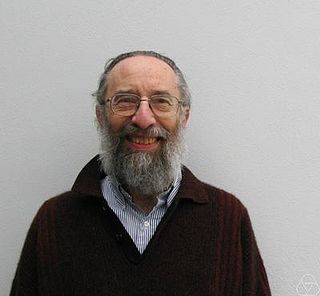
In mathematics, computable numbers are the real numbers that can be computed to within any desired precision by a finite, terminating algorithm. They are also known as the recursive numbers, effective numbers or the computable reals or recursive reals. The concept of a computable real number was introduced by Emile Borel in 1912, using the intuitive notion of computability available at the time.
Computability theory, also known as recursion theory, is a branch of mathematical logic, computer science, and the theory of computation that originated in the 1930s with the study of computable functions and Turing degrees. The field has since expanded to include the study of generalized computability and definability. In these areas, computability theory overlaps with proof theory and effective descriptive set theory.

In mathematical logic, the arithmetical hierarchy, arithmetic hierarchy or Kleene–Mostowski hierarchy classifies certain sets based on the complexity of formulas that define them. Any set that receives a classification is called arithmetical. The arithmetical hierarchy was invented independently by Kleene (1943) and Mostowski (1946).
In computer science and mathematical logic the Turing degree or degree of unsolvability of a set of natural numbers measures the level of algorithmic unsolvability of the set.
In computability theory, a Turing reduction from a decision problem to a decision problem is an oracle machine that decides problem given an oracle for . It can be understood as an algorithm that could be used to solve if it had available to it a subroutine for solving . The concept can be analogously applied to function problems.
In computability theory, the Turing jump or Turing jump operator, named for Alan Turing, is an operation that assigns to each decision problem X a successively harder decision problem X′ with the property that X′ is not decidable by an oracle machine with an oracle for X.
Gerald Enoch Sacks was a logician whose most important contributions were in recursion theory. Named after him is Sacks forcing, a forcing notion based on perfect sets and the Sacks Density Theorem, which asserts that the partial order of the recursively enumerable Turing degrees is dense. Sacks had a joint appointment as a professor at the Massachusetts Institute of Technology and at Harvard University starting in 1972 and became emeritus at M.I.T. in 2006 and at Harvard in 2012.
In mathematical logic, second-order arithmetic is a collection of axiomatic systems that formalize the natural numbers and their subsets. It is an alternative to axiomatic set theory as a foundation for much, but not all, of mathematics.
In recursion theory, α recursion theory is a generalisation of recursion theory to subsets of admissible ordinals . An admissible set is closed under functions, where denotes a rank of Godel's constructible hierarchy. is an admissible ordinal if is a model of Kripke–Platek set theory. In what follows is considered to be fixed.
In computability theory, hyperarithmetic theory is a generalization of Turing computability. It has close connections with definability in second-order arithmetic and with weak systems of set theory such as Kripke–Platek set theory. It is an important tool in effective descriptive set theory.
In proof theory, ordinal analysis assigns ordinals to mathematical theories as a measure of their strength. If theories have the same proof-theoretic ordinal they are often equiconsistent, and if one theory has a larger proof-theoretic ordinal than another it can often prove the consistency of the second theory.

Richard Arnold Shore is a professor of mathematics at Cornell University who works in recursion theory. He is particularly known for his work on , the partial order of the Turing degrees.
A timeline of mathematical logic; see also history of logic.
In mathematical logic, true arithmetic is the set of all true first-order statements about the arithmetic of natural numbers. This is the theory associated with the standard model of the Peano axioms in the language of the first-order Peano axioms. True arithmetic is occasionally called Skolem arithmetic, though this term usually refers to the different theory of natural numbers with multiplication.
In mathematics, a fake projective plane is one of the 50 complex algebraic surfaces that have the same Betti numbers as the projective plane, but are not isomorphic to it. Such objects are always algebraic surfaces of general type.
In the mathematical field of computability theory, a PA degree is a Turing degree that computes a complete extension of Peano arithmetic (Jockusch 1987). These degrees are closely related to fixed-point-free (DNR) functions, and have been thoroughly investigated in recursion theory.
Marcia Jean Groszek is an American mathematician whose research concerns mathematical logic, set theory, forcing, and recursion theory. She is a professor of mathematics at Dartmouth College.
The Gödel Lecture is an honor in mathematical logic given by the Association for Symbolic Logic, associated with an annual lecture at the association's general meeting. The award is named after Kurt Gödel and has been given annually since 1990.



